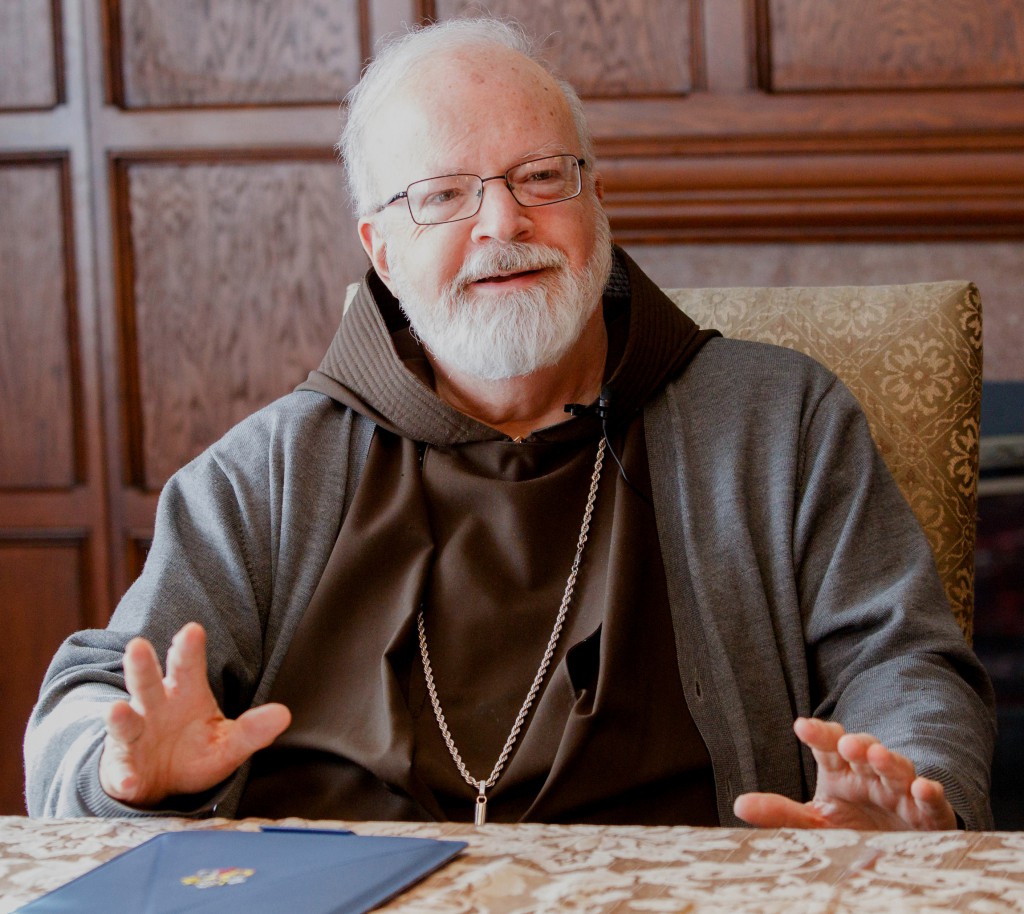
NEW YORK (CNS) — Boston Cardinal Sean P. O’Malley said Pope Francis is a quintessential Ignatian Jesuit who has melded Jesuit and Franciscan spirituality into his approach to the papacy.
“Our pope is thoroughly Jesuit and thoroughly Ignatian, right down to the fascination with St. Francis,” he said. And he is helping the world rediscover the joy of the Gospel for the greater glory of God, the cardinal said.
St. Ignatius founded the Society of Jesus, known as the Jesuits. Its motto is, “For the greater glory of God.”
Cardinal O’Malley, a Capuchin Franciscan, spoke to more than 175 people at a March 19 forum on the Jesuit pope’s first anniversary, held at the American Bible Society. The forum was co-sponsored by the Archdiocese of New York Catechetical Office and Crossroads Cultural Center. It was the second of three anniversary discussions led by Cardinal O’Malley — in Baltimore, New York and Chicago.
Pope Francis has embraced the vocation of being a follower of St. Ignatius who wants to be a saint like St. Francis, Cardinal O’Malley said. He lives his Jesuit vocation with intense missionary spirit, a love for community that supports the mission and a disciplined life that does not want to waste anything, especially time.
The cardinal said Pope Francis embraces the introspection central to Jesuit spirituality, which is part of St. Ignatius’ plan to keep Jesuits focused on God, despite their activist lifestyle.
The pope’s discernment “frees him from doing some things in a certain way because it was always thus” and he is comfortable enough in his own skin that he is “not restrained by practices of pontificates in the past,” Cardinal O’Malley said.
The cardinal is one of eight members of the pope’s advisory Council of Cardinals. In a wide-ranging discussion after his address, Cardinal O’Malley said Pope Francis is on a steep learning curve, particularly with respect to the church in the United States.
“The Holy Father can’t tackle all the issues at once. He has to prioritize in his mind,” the cardinal said. “He is certainly very, very open to ideas and suggestions. He doesn’t know the church in America well, but he is interested in learning more. His openness and inquisitiveness is encouraging to me.”
Cardinal O’Malley said the pope’s changes in the preparation and structure of synods as well as his selection of cardinal advisers from around the globe indicate he is trying to position himself to learn more and reach out to the universal church. “I’m amazed at how collegial he is,” the cardinal said.
The pope is anxious to launch a committee for child protection, which is coming soon, and has recently spent a lot of time on the abuse issue, Cardinal O’Malley said. “His love for people and his sense of God’s mercy is something that energizes everything he does and he brings that also to the way he looks at the sex abuse crisis.”
The cardinal acknowledged he is “trying to be of service to the Holy Father in this area” because he has more experience than the other cardinal advisers.
Cardinal O’Malley said Pope Francis could be expected to change pastoral practice, but not doctrine. Paraphrasing a Rolling Stone magazine profile of the pope, he said Francis has changed the lyrics and not the melody.
The cardinal also said upcoming changes in the structures of Vatican departments and pontifical councils would likely open new posts for women. “Once the decisions are made about what the structure is going to look like, I think the Holy Father will be looking to place women in the structure that’s being contemplated. The Holy Father is very anxious to do that,” Cardinal O’Malley said.
Pope Francis’s unsought celebrity status comes from people’s fascination with his style, the cardinal said. The pope’s desire to be with people strikes a chord in their hearts because it is counter to contemporary individualistic culture where people are alienated.
“People love what this man symbolizes. It’s speaking to them. It goes beyond celebrity. The Holy Father is trying to get rid of some of the trappings and humanize the papacy, but it is his message, which is so evangelical and so needed, that is evoking a strong response.”
Cardinal O’Malley said it would be difficult for successive popes to move backward from the changes Pope Francis is making in the Curia, including greater transparency and professionalism in the way the financial resources of the church are used for mission.
The cardinal said Pope Francis doesn’t have patience with the “humbug and clericalism” that get in the way of the greater mission to help people “be so on fire with our love for Christ in the Gospel that we’ll want to go out and share that joy with other people.”
Kenneth Woodward, former religion editor of Newsweek magazine, moderated the discussion. Questions were posed by panelists Jesuit Father Matt Malone, editor in chief of America magazine, R.R. Reno, editor of First Things magazine, and Mollie Wilson O’Reilly, associate editor of Commonweal magazine.







